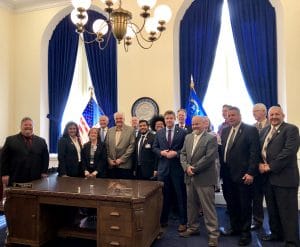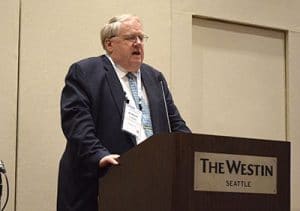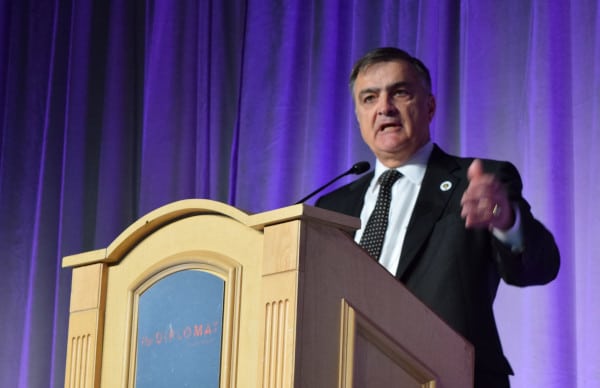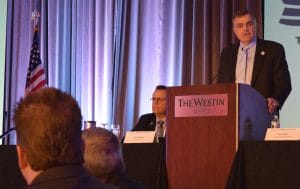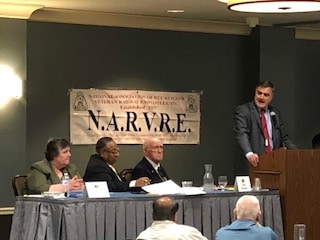The advocacy and hard work of SMART Transportation Division members and retirees, the Nevada State Legislative Board and a coalition that included Sheet Metal brothers and sisters, other rail unions and safety-conscious members of the public has paid off.
Nevada Gov. Steve Sisolak signed A.B. 337 on May 15. Two-person crews are now required on Class I and II freight trains being operated in the state or the carriers will face steep fines.
The bill’s signing caps a massive effort by SMART TD members that spanned years in the face of carrier opposition.
“This law didn’t pass by accident. It was the hard work of Jason Doering, our Nevada state legislative director, and others that made it happen,” SMART TD National Legislative Director John Risch said. “We all owe Jason and others who worked on this our thanks for keeping train operations safe in Nevada, for not just those who operate trains but for the public as well.”
Doering and his board assembled a group of dedicated advocates who helped to spread the important message about how crew size is, first and foremost, about keeping communities safe.
“Many people helped to get the word out about the public safety ramifications of this legislation,” Doering said. “Those concerted efforts paid off, and now we’ve ensured that the state’s railways stay safe with two crew members in each freight train’s cab.”
The legislation was sponsored in the State Assembly by Susie Martinez, a Teamster who, Doering said, “treated him like family” and whose staffer, Carlos Hernandez, assisted in the early stages of getting the bill passed.
Additional backers included Assemblywoman Maggie Carlton, also a primary sponsor of the legislation, as well as Assemblywoman Shea Backus, who testified before the state Senate and expressed strong support during an Assembly Growth and Infrastructure Committee hearing, and Assemblyman Richard Carrillo, another co-sponsor whose father was a United Transportation Union member.
“Really — all of the Nevada Assembly and Senate Democrats, as well as the governor, receive my thanks for their understanding of the important protection to public safety that this law provides,” Doering said. “There is too much risk involved in transporting hazardous materials and goods across our country and through our communities to have a single crewmember on trains that are a mile long or even longer.”
The law establishes fines of $5,000 for a first offense, $10,000 for a second offense within three years and $25,000 for a third and all other offenses for Class I and II carriers that operate freight locomotives without at least two people in the cab. Hostling and helper services are not covered by the law.
Doering and his board were stung by the 2017 veto by then-Gov. Brian Sandoval, a Republican, of S.B. 427, a prior try at two-person crew legislation that had passed both houses of the Nevada state Legislature.
But a change in leadership brought a new opportunity with Sisolak’s election last year.
“No doubt we were disappointed in 2017, but this is a prime example of how elections matter,” Doering said. “We cracked open the door with our previous effort and laid the groundwork. With that change in leadership in the state Capitol, it was opened even wider.”
The Nevada State Legislative Board especially wanted to thank members from SMART’s Sheet Metal Local 88 out of Las Vegas, who helped to amplify the message.
“They were an extraordinary help!” Doering said. “Jeff Proffitt and Alfonso Lopez — we couldn’t have moved anything without their support. Sheet Metal put rail labor on the map in Nevada.”
Also advocating for the legislation was Fran Almaraz, who helped set up meetings and facilitated a relationship with legislative leadership, Doering said.
Assisting the cause as well were TD Colorado State Legislative Director Carl Smith, who provided guidance after succeeding earlier this year in getting two-person legislation made into law in his state, Dean Mitchell, who helped in researching and targeting the message and the TD Public Relations Department, which helped to compose an op-ed published by the Nevada Independent and put together print material to get the word out about the legislation.
And, as he did with S.B. 427, Brotherhood of Locomotive Engineers and Trainmen’s Nevada State Legislative Board Chairman Matt Parker mobilized BLET members to advocate loudly in favor of the legislation.
“It truly was a team effort,” Doering said.
A.B. 337 was approved April 23 by the State Assembly by a 29-12 vote and in the state Senate on May 7 by 13-8 margin. Both votes were party line with Democrats voting in favor of the legislation.
Nevada now joins Arizona, California, Colorado, West Virginia and Wisconsin as states that have legislation requiring two people to operate freight trains.
“This successful passage in Nevada proves that our persistence pays off,” Risch said. ”Concerning two-person crews, the message of public safety did not change from two years ago and will not change going forward. It’s that simple. Two crew members are vital to ensuring that these trains are operated safely and that our communities are secure.
“Legislators in Nevada knew this before, and they know it now. As a result of the 2018 election, the leadership in the governor’s office changed and now this safety-focused, common-sense bill has been made law.”
A.B. 337 takes effect Oct. 1.
Tag: John Risch
The Federal Railroad Administration (FRA) will have some major shoes to fill with the April 13, 2019, retirement of Robert “Bob” Lauby, the agency’s chief safety officer.
Lauby had served in that capacity for FRA since September 2013. He was a frequent presenter at SMART Transportation Division regional meetings and worked to provide regulatory oversight for rail safety in the United States while overseeing the development and enforcement of safety regulations and programs related to the rail industry.
“Serving as the associate administrator for Railroad Safety and FRA’s chief safety officer is one of the highlights of my career,” Lauby said. “The job has been both challenging and fulfilling.
“Over the years, we grappled with many important issues and have significantly changed the industry for the better.”
Lauby had a hand in several regulatory safety efforts at FRA such as Positive Train Control, conductor certification, training requirements, drug and alcohol testing for maintenance of way employees, roadway worker protection, passenger equipment standards, system safety and others.
Other safety oversight improvements happened as a result of major accidents. Some of the major ones included crude-oil accidents at Lac Megantic, Ontario, Canada; Mount Carbon, W.Va.; and other locations; commuter train accidents at Spuyten Duyvil and Valhalla, N.Y.; and Amtrak passenger train accidents in Philadelphia and Chester, Pa.; Dupont, Wash.; and Cayce, S.C.
“No matter the challenges swirling around him, Bob had safety in mind,” said National Legislative Director John Risch. “He’s been great to work with and one of the most committed, level-headed professionals in the rail industry.”
Lauby said that he treasured any interaction he could have with members of rail labor as these helped to broaden his perspective about whom he was working to protect.
“I always took time to talk to the SMART TD membership to get their complaints, opinions, and perspectives on the latest industry issues,” Lauby said. “I often left enlightened or with a new perspective.
“Railroad managers are experts on what is supposed to happen. SMART TD members are experts on what actually happens. They always know what works and what does not work.”
In his more-than-40-year career, Lauby’s railroad and transit experience included safety, security, accident investigation, project management, project engineering, manufacturing and vehicle maintenance.
He joined the FRA in August 2009 as staff director of its newly established Passenger Rail Division in the agency’s Office of Safety and was later promoted to deputy associate administrator for regulatory and legislative operations at FRA. One of his responsibilities in that role was to oversee the Rail Safety Advisory Committee (RSAC).
Prior to his time at FRA, Lauby was director of the National Transportation Safety Board’s Office of Railroad Safety, overseeing hundreds of rail accident investigations for NTSB and coordinating with our union’s Transportation Safety Team in many investigations. He was NTSB’s representative on RSAC.
“At our regional meetings, I would introduce Bob and tell the troops that Bob was the big gun and can handle all the tough questions, which he always did,” Risch said at a party celebrating Lauby’s retirement in late March.
Lauby said he took his multiple presentations at TD regional meetings, including at the Seattle regional meeting last July, seriously — he felt he owed it to the attendees to give them useful information.
“I looked forward to the meetings each year and spent hours preparing my presentation and preparing for the questions I would get at the end – during the Q and A session,” he said. “I wanted the material I presented to be timely and useful to the membership, and I always tried to include the inside scoop – the stuff nobody else would talk about!”
But the benefits from his visits and interactions went both ways, he said, and showing up at the meetings gave him a fresh perspective on the industry.
“I always enjoyed speaking to the SMART TD membership – both at the Regional Meetings and when they were on their jobs,” Lauby said. “Whenever I traveled by train, I tried to spend time with the train crew or ride the head end to find out the issues of the day.
“I learned more about railroading from the working men and women of the railroad industry than from anyone else.”
Lauby’s departure is leaving a vacancy that FRA will have a difficult time filling, Risch said.
“No one will really fill your shoes because there is no one with the knowledge and experience to do that,” he told Lauby at his retirement party. “You committed your working life to rail safety, you have been a good friend of mine and a good friend to railroad workers everywhere.
“We wish you all the best as you enter this next stage of your life.”
Lauby said his career leaves him with a sense of gratitude.
“I will always be grateful to have had the opportunity to work in the industry I love, in a role where I felt I could make a difference,” Lauby said. “I will miss the thousands of people I interacted with each year. That includes the FRA employees and railroad industry labor and management … all the folks I dealt with at the various RSAC meetings. People are the most important part of any organization and the railroad industry is no different.”
An article published March 28 on the website of the Sightline Institute follows up on an Associated Press report from over the winter about the Department of Transportation’s repeal of the Federal Railroad Administration’s electronically controlled pneumatic (ECP) brake rule for tanker cars.
In late December, the AP reported that the Trump administration did not consider in its calculations the most-common type of derailment.
In addition to the AP findings, writers Aven Frey and Eric de Place for the Seattle-based Sightline Institute, which advocates on sustainability and environmental issues in the Pacific Northwest, also said that “PHMSA and the FRA low-balled their predictions for oil train numbers, an assumption that tilted the analysis in favor of the industry.”
SMART Transportation Division has been in favor of the installation of ECP brakes on tanker cars, with National Legislative Director John Risch calling them “the safest, most advanced braking systems in the world.”
The Sightline Institute piece notes that the ECP rule’s repeal “put rail-side communities at substantial risk across the Northwest, particularly because we can expect to see oil train shipping to significantly increase again.”
In response to the repeal of the ECP rule, legislators in the region have taken note.
The Washington State Senate has passed legislation that requires crude oil to be transported by rail to be conditioned to meet a vapor standard that reduces the potential for explosive ignition.
Also, U.S. Rep. Jaime Herrera Beutler, a Republican from Battle Ground, Wash., has twice introduced legislation that reinstates the ECP rule. The current version of the Oil and Flammable Material Rail Safety Act is H.R. 851 and was introduced in January.
Read the entire Sightline Institute article here.
